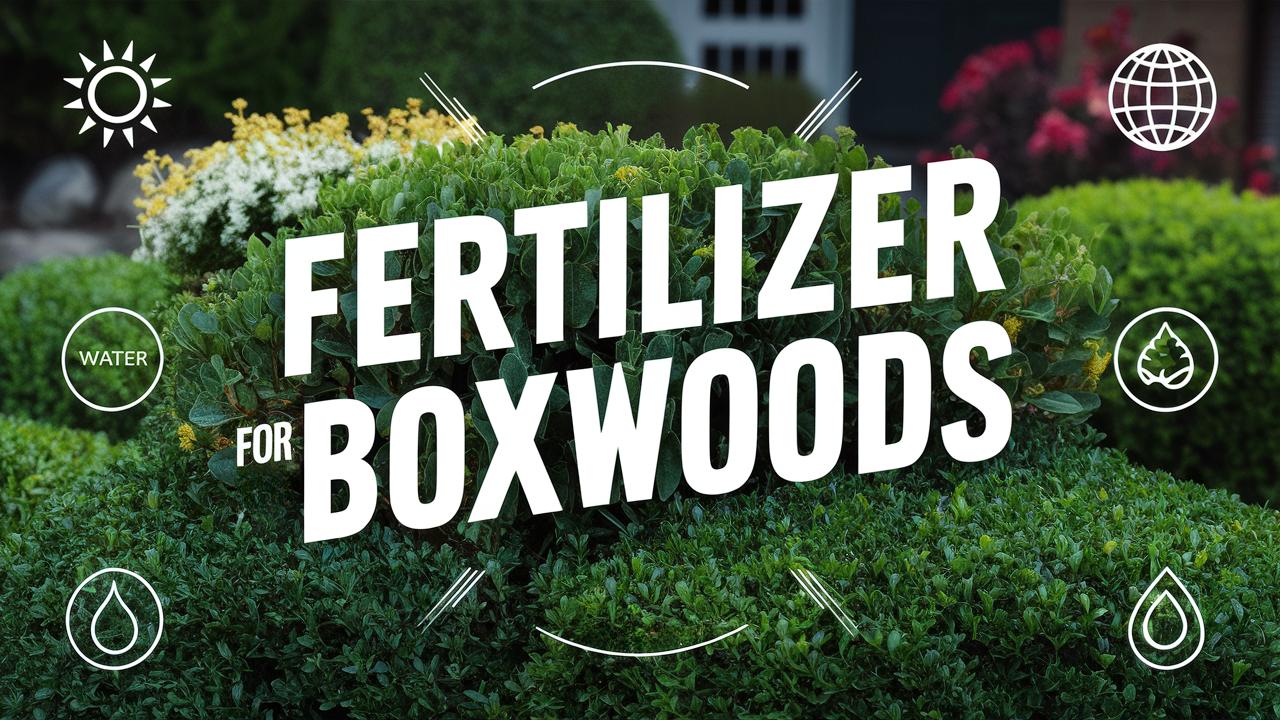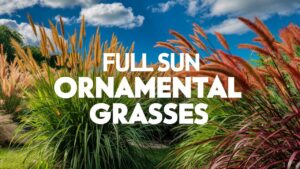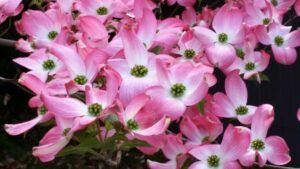In this guide, we’ll explore everything you need to consider to select the perfect fertilizer for your boxwoods, ensuring they remain lush and vibrant.
Fertilizer For Boxwoods
| Image | Name | Rating | Shop |
|---|---|---|---|
 | Boxwood Booster |  | |
 | BioAdvanced Tree & Shrub Protect and Feed |  | |
 | Boxwood Fertilizer |  |
Boxwood Booster
For a fertilizer specifically designed to promote the growth and health of boxwoods, consider using Boxwood Turbo Grow Professional Boxwood Fertilizer. This product is formulated with a blend of essential nutrients that provide a nutrient boost for fast growth.
This granular fertilizer is absorbed directly by the roots of the plants, making it fast acting and effective in preventing and repairing yellowing of leaves. It also helps to ensure bright green, lush, and healthy leaves. The NPK ratio and additional minerals in Boxwood Turbo Grow make it a good option for maintaining the health and appearance of your boxwoods.
BioAdvanced Tree & Shrub Protect and Feed
This product is a good choice for boxwoods due to its slow-release fertilizer that improves the health of trees and shrubs. The fact that it provides systemic protection from roots to leaves ensures that your boxwood will be well-nourished.
The BioAdvanced 12 Month Tree and Shrub Protect and Feed Granules also serve as an insecticide, killing listed insects such as Japanese beetles and aphids. This makes it a convenient option for those looking to protect their plants from pests while also providing them with essential nutrients for growth. The easy-to-apply granules require no spraying, making them suitable for outdoor use on containerized or planted boxwoods.
Boxwood Fertilizer
Are you looking to give your boxwoods a nutrient boost? Consider using Boxwood Fertilizer, Complete Liquid Boxwood Shrub Plant Food, 8 oz (250mL). This formula is designed specifically for boxwood plants, providing them with the necessary nutrients to encourage dense foliage and healthy growth.
The ease of use and instructions make it perfect for gardening beginners or experienced gardeners alike. With the complete formula including all essential nutrients, you can trust that your boxwoods will receive the care they need to thrive. Plus, being made in the USA provides assurance of quality and production standards met. Give your boxwoods the love they deserve with this fertilizer and watch them grow strong and healthy.
TOPBUXUS Boxwood Restore & Protect Mix.
Looking for a reliable fertilizer for your boxwoods? We recommend Boxwood Restore & Protect Mix, a leaf fertilizer specifically designed to promote healthy growth and lush foliage for your boxwood plants. Available in easy-to-use effervescent tablets, this mix provides all the necessary nutrients for optimal care.
The Boxwood Restore & Protect Mix is perfect for larger areas of boxwoods as it covers 100m2 per tub. Simply place a tablet in a liter of water, let it dissolve, and then spray it evenly onto your boxwoods using a pressure sprayer. This 8-0-10 leaf fertilizer with natural secondary nutrients has been developed by TOPBUXUS, the world’s largest boxwood grower, based on years of testing and use on their own nursery in the Netherlands.
Miracle-Gro Tree & Shrub Plant Food Spikes
The Miracle-Gro Tree and Shrub Plant Food Spikes is a great choice for boxwoods in need of some extra nourishment. These plant food spikes are specifically designed to promote vibrant color and foliage, and can be used with deciduous, flowering, and evergreen trees like boxwoods.
To use the Miracle-Gro Tree and Shrub Plant Food Spikes on your boxwood, simply place one or two spikes around the tree’s drip line (the area where water would collect) in the spring and fall. Make sure to space them at least 3 feet apart to ensure even distribution of nutrients. One package includes 12 spikes, which should be enough to cover a relatively small to medium-sized boxwood.
Evergreen-tone
This is a great fertilizer for boxwoods. Specifically, I’m recommending Espoma Organic Evergreen-Tone 4-3-4 Natural & Organic Fertilizer and Plant Food. This product is perfect for promoting optimum growth in your evergreen trees and shrubs, including boxwoods.
I like that this fertilizer is organic and environmentally safe. It’s a rich blend of natural ingredients enhanced with the Bio-tone formula, which provides a 4-3-4 fertilizer analysis. The addition of 5% sulfur also makes it effective for promoting healthy growth in your boxwoods. Plus, since it’s ready to use and requires no mixing, you can easily apply it to your plants when planting or feeding established plants.
Miracle-Gro Shake ‘N Feed Flowering Trees & Shrubs Plant Food However, for simplicity and adherence to guidelines provided: Shake ‘N Feed Flowering Trees & Shrubs
Miracle-Gro Shake ‘N Feed Flowering Trees and Shrubs Plant Food is a good product to use on your boxwoods. It’s specially formulated to help flowering trees and shrubs maintain deep, lush green foliage and colorful blooms throughout the season.
This organic plant food contains natural ingredients like kelp, earthworm castings, bone meal, and feather meal that feed plants for up to 3 months without burning them. You can use it on your boxwoods in both in-ground gardens or containers, and reapply every 3 months for the best results.
How To Choose a Fertilizer For Boxwoods
Boxwoods, or Buxus, are beloved for their timeless beauty, versatility, and enduring green presence in gardens and landscapes. Their ability to be shaped into hedges, topiaries, or left to grow naturally makes them a favorite among gardeners. However, like all plants, boxwoods require the right nutrients to thrive. Choosing the correct fertilizer is vital for their health and vigor.
Understanding the Nutritional Needs of Boxwoods
Before diving into specific fertilizers, it’s crucial to understand what boxwoods need to flourish. Boxwoods thrive best in well-drained, fertile soils rich in organic matter. These evergreen shrubs require balanced nutrition to promote healthy growth, maintain color, and resist pests and diseases.
Key Nutrients for Boxwoods
Nitrogen (N): Essential for promoting leafy growth and overall vigor. A nitrogen-rich fertilizer facilitates the development of lush, green foliage.
Phosphorus (P): Important for root development, flowering, and overall plant energy transfer. While boxwoods are primarily appreciated for their foliage, strong root systems support their long-term health.
Potassium (K): This nutrient helps in drought resistance, disease management, and overall plant health. A potassium-rich fertilizer can enhance the boxwood’s ability to withstand stress.
Micronutrients: Elements like iron, manganese, and zinc may also be necessary in lesser quantities but are vital for various physiological functions within the plant.
Understanding these nutrients will help you identify fertilizers that align with the specific needs of your boxwoods.
Soil Testing: Why It Matters
Before selecting a fertilizer, consider testing your soil. Soil testing provides valuable insights into the existing nutrient levels and pH balance of your garden soil. Many local extension services or garden centers offer affordable soil testing kits.
Steps for Soil Testing
Collect Soil Samples: Gather samples from several spots around your boxwoods to get a comprehensive understanding of your soil’s health.
Follow Testing Instructions: Send your samples to a lab or use a home testing kit, following the included instructions for accurate results.
Analyze Results: Determine the pH and nutrient levels, which will guide your fertilizer choices. Most boxwoods prefer slightly acidic to neutral soil, pH 6.0 to 7.0.
Understanding your soil will enable you to choose fertilizers that supplement deficiencies and maintain a balanced nutrient profile.
Types of Fertilizers for Boxwoods
Now that you’re familiar with the essential nutrients and the importance of soil testing, it’s time to explore the various types of fertilizers available.
1. Granular Fertilizers
Granular fertilizers are popular for their ease of application. These fertilizers come in synthetic or organic formulations and release nutrients slowly over time.
Synthetic Granular Fertilizers: Often have a higher concentration of nutrients and may include slow-release formulations. Look for a balanced fertilizer, such as a 10-10-10, which provides equal parts of nitrogen, phosphorus, and potassium.
Organic Granular Fertilizers: Derived from natural sources, these include composted manures and plant byproducts. They enrich the soil with organic matter, improving water retention and microbial activity.
Application Tip: Apply granular fertilizers early in the spring, before new growth starts. Follow the packaging instructions regarding the amount to use based on the size and age of your boxwoods.
2. Liquid Fertilizers
Liquid fertilizers offer immediate nutrient availability and are ideal for quickly addressing deficiencies. These can be synthetic or organic and can be applied through watering or as a foliar spray.
Synthetic Liquid Fertilizers: Often available as concentrated solutions, these are diluted with water for application. They have a fast-acting nature, making them suitable for quick fixes.
Organic Liquid Fertilizers: These include fish emulsion and seaweed extracts, which not only provide nutrients but also promote healthy soil biology.
Application Tip: Liquid fertilizers should be used during the growing season, ideally every 4-6 weeks, to keep nutrients readily available.
3. Slow-Release Fertilizers
Slow-release fertilizers gradually release nutrients over time, reducing the frequency of applications. These products can be granular or encapsulated and are ideal for busy gardeners who prefer less maintenance.
Application Tip: Generally applied in spring, slow-release fertilizers can persist for several months, feeding your boxwoods steadily.
4. Organic Options
Choosing organic fertilizers can be beneficial for both your plants and the environment. Organic options enrich soil health over time, promoting beneficial microorganisms and improving soil structure.
Compost: Often the best choice for boxwoods, compost provides nutrients while also improving soil aeration and moisture retention.
Bone Meal and Blood Meal: These organic fertilizers are high in phosphorus (bone meal) and nitrogen (blood meal). They can be mixed into the soil around your plants.
Application Tip: Regularly adding organic material such as compost can significantly enhance the soil quality and provide a slow, steady supply of nutrients.
Timing Your Fertilizer Application
Choosing the right fertilizer is only part of the equation; timing your application is equally important for optimal growth.
Spring Feeding
In early spring, as new growth begins, apply your chosen fertilizer. This is when boxwoods are actively growing, and the nutrients will support robust foliage development.
Summer Maintenance
During the summer months, particularly if you notice yellowing leaves or slowed growth, consider applying a liquid fertilizer. This helps address any nutrient deficiencies that may have arisen due to established root systems draining soil nutrients.
Fall Considerations
Boxwoods are evergreen and continue to require nutrients, even in the fall. However, be cautious not to over-fertilize during this time. A light application of a balanced fertilizer in early fall can help support root development as your boxwoods prepare for winter.
Avoiding Late Winter/Fall Fertilizing
Fertilizing too late in the growing season can stimulate new growth that may not harden off before winter, making your boxwoods vulnerable to cold damage.
Signs That Your Boxwoods Need Fertilizer
Understanding the signs that your boxwoods may need additional nutrients can help you maintain their health and vitality. Regular observation of your plants can cue you into changes that require attention.
Yellowing Leaves
If you notice yellow leaves, especially if they are older leaves, this could indicate a nitrogen deficiency. New growth should be a vibrant green, so monitor for early signs of leaf color changes.
Stunted Growth
If your boxwoods are not growing as expected during the growing season, it may be time to assess their nutrient levels. Boxwoods should generally exhibit healthy new growth, and if they appear stunted, they may need fertilization.
Poor Color
Loss of vibrancy in foliage or a general dullness can indicate nutrient deficiencies, particularly a lack of essential micronutrients.
Best Practices for Fertilizing Boxwoods
To ensure successful fertilization of your boxwoods, consider the following best practices:
1. Follow Package Instructions
Whether using granular or liquid fertilizers, always follow the manufacturer’s application guidelines to avoid over-fertilization, which can be harmful to plants.
2. Watering
When applying fertilizers, especially granular types, water your boxwoods subsequently. This helps in activating the nutrients in the fertilizer and ensures they reach the root zone effectively.
3. Mulching
Adding a layer of mulch around the base of your boxwoods can help retain soil moisture, regulate soil temperature, and suppress weed growth. Organic mulch like wood chips or shredded leaves can also slowly break down, providing additional nutrients.
4. Observe and Adjust
After fertilizing, keep an eye on your boxwoods. If they respond positively, you may have found a successful feeding schedule. If issues persist, consider re-evaluating your fertilizer choice or soil conditions.
Environmental Considerations When Choosing Fertilizers
Sustainability is increasingly important in gardening. Many gardeners today prefer fertilizers that are environmentally friendly. Organic fertilizers not only support plant health but also improve soil life and reduce the risk of waterway contamination.
Choosing Eco-Friendly Options
Organic certifications: Look for fertilizers with organic certifications to ensure they meet environmental standards.
Local sources: Utilizing local manure-based compost or soil amendments can minimize the carbon footprint caused by shipping fertilizers from long distances.
By aligning your fertilization practices with sustainable principles, you can help preserve both your landscape and the environment.
Conclusion
Choosing the right fertilizer for your boxwoods is an essential aspect of maintaining their lushness and vitality. By understanding their nutritional needs, conducting soil tests, and recognizing the importance of timing and application techniques, you can provide your boxwoods with the ideal growing conditions.









